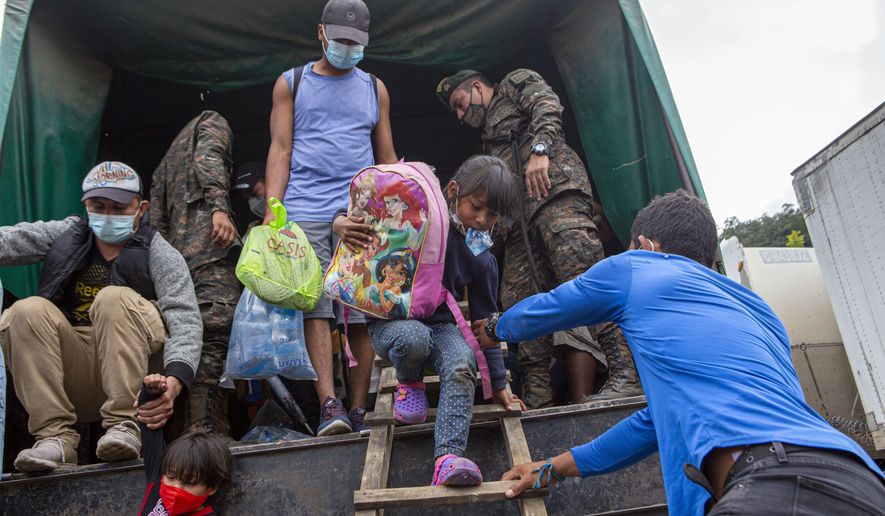A Homeland Security-backed study has found that it’s unlikely Central American countries can boost their economies enough to stop people from trying to migrate to the U.S., undercutting President Biden’s plans to rely on nation-building to curb the border surge.
Incomes rise tenfold — an incomparable lure — for migrants from the key Northern Triangle countries of Guatemala, Honduras and El Salvador by working in the U.S., according to the Borders, Trade and Immigration Institute.
“The potential economic gain following migration from the Northern Triangle to the U.S. is enormous,” the institute concluded. “In the presence of a wage gap this large, even significant percentage changes in home-country income will have relatively little quantitative impact on the gain that could be expected from migration.”
Inviting more migrants or curtailing deportations of those in the U.S. could worsen the surge.
The BTI study said the Northern Triangle economies have become dangerously dependent on migration to the U.S. because of the cash their citizens send back home. That, in turn, may be hurting the countries’ export markets, or what is known in economics as “Dutch disease,” further depressing the economies.
The findings were released as Vice President Kamala Harris returned from a trip to the region. She said the record-setting border surge afflicting the Biden administration is spawned by people seeking better jobs, fleeing violence or being pushed from their homes by environmental effects of a changing climate.
“We know that the reason why people are coming to our border is because of the problems in the region, or in the countries, of economic and food insecurity or long-standing damage from weather events such as hurricanes,” one administration official said last week in summing up Ms. Harris’ trip to Guatemala and Mexico.
Those explanations are problematic, according to the BTI Institute, a Homeland Security Center of Excellence led by the University of Houston, which studied survey data of migrants who have been deported and of people in the Northern Triangle who want to migrate. They found little evidence that weather plays a role in migration decisions.
Family reunification and crime may be causes, but economic opportunity is the overwhelming factor for most traditional migrants from the Northern Triangle — those who don’t have valid asylum claims.
“This poses an important challenge for trying to use economic development as a way of affecting migration decisions,” the analyst said. “Even if development policies are successful, their impact on migration decisions may be relatively marginal.”
It’s not just survey data.
The report looked at historical cases such as Mexico, which had a massive wave of migration, mostly illegal, in the 1990s. The numbers dropped dramatically by 2010.
Researchers emphasized that more study is needed, but they said the drop in Mexican migration “can be attributed to demographic changes in Mexico and the U.S. as well as changes in U.S. enforcement policies, but it is not due to improved economic outcomes for potential migrants in Mexico.”
The researchers also looked at Puerto Rico, a U.S. territory with no legal barrier, where migration to American states was significant in the 1950s and 1960s. Economic improvements and government assistance curtailed that flow, but incomes diverged again in recent years, resulting in another “mass exodus from the island.”
The White House didn’t respond to a request for comment on the report. Officials insisted that Ms. Harris’ trip was a success despite her struggles to handle questions about the situation at the U.S.-Mexico border.
During her visit to Guatemala, Ms. Harris said her message to would-be migrants right now was “Don’t come.”
Republican members of Congress said the administration’s actions have belied that message. Policies have cleared the way for tens of thousands of illegal immigrants each month to gain a foothold in the U.S.
Activists from the left, meanwhile, said Ms. Harris’ message to Central Americans was too harsh.
In an interview with Ms. Harris, Spanish-language network Univision suggested that she was betraying her own roots as a daughter of immigrants.
The Working Families Party, a prominent liberal organization, called Ms. Harris’ words “callous” and said they “reinforce the anti-immigrant and xenophobic policies put into place by the Trump administration.”
“For people who are making the difficult decision to flee corruption, crime, and violence in the hopes of building better lives for their families, no message is likely to change their minds,” the party said in an email to supporters.
The Biden administration says it is trying to create more legal pathways for Central Americans seeking asylum and those interested in higher wages.
On the wages front, the administration is considering carve-outs to give the Northern Triangle countries special access to guest-worker visas.
But the BTI analysis says the countries have become addicted to the remittances, or money, that workers send back from the U.S.
In all three countries, remittances account for more than 70% of exports of goods and services. Remittances serve as a vital source of foreign hard currency.
Cutting off that flow of money would be catastrophic for the home countries, but it “may also inhibit achieving economic development in the longer run,” the study said.
Guatemalan President Alejandro Giammattei drove home that point last week. He told Ms. Harris that he wants the U.S. to grant deportation amnesty to illegal Guatemalan immigrants already in the U.S. so they can send back cash now.
But he also said he hopes Guatemalans will learn financial skills “so that they can establish and grow companies and enterprises here in Guatemala so that they can come back to this country to create opportunities with what we have learned abroad.”
• Stephen Dinan can be reached at sdinan@washingtontimes.com.




Please read our comment policy before commenting.